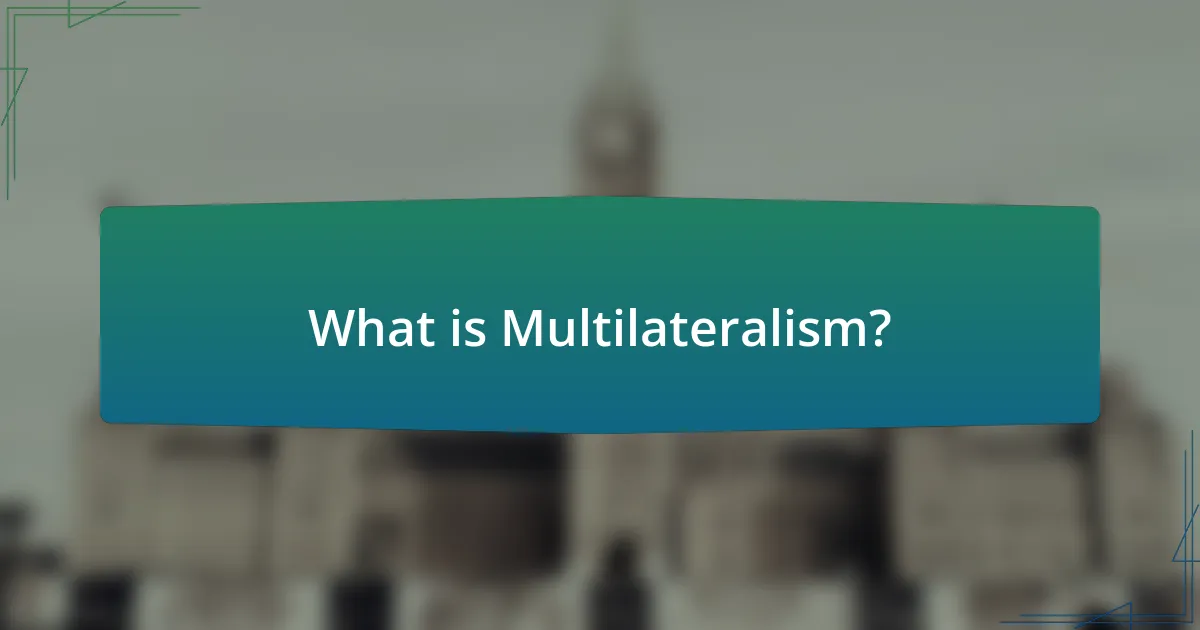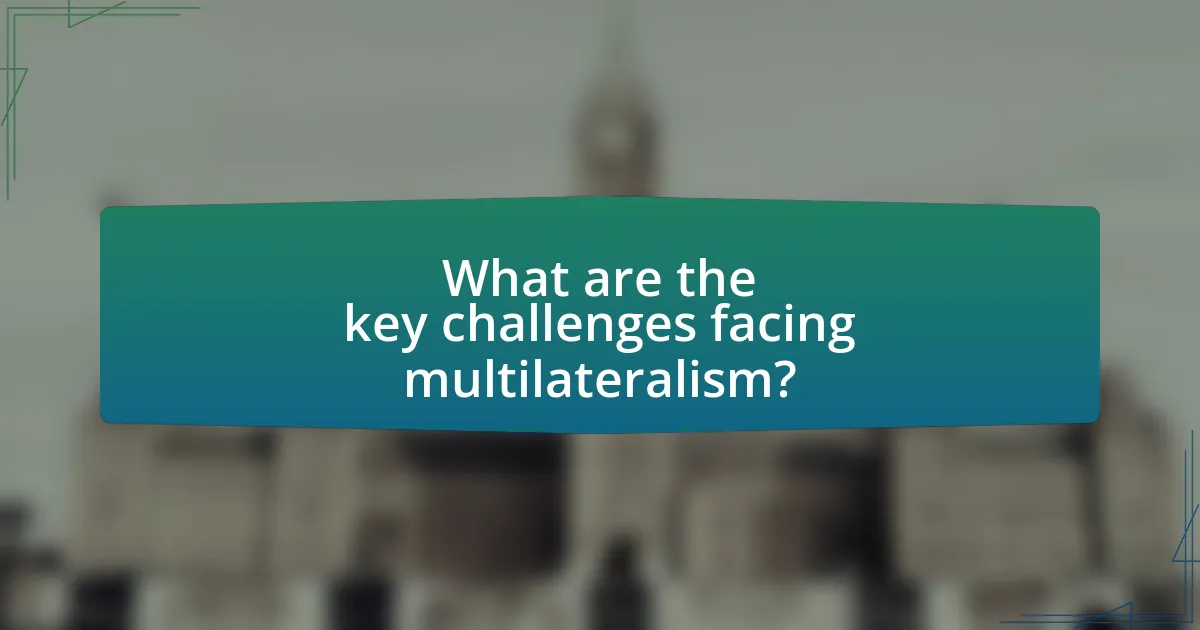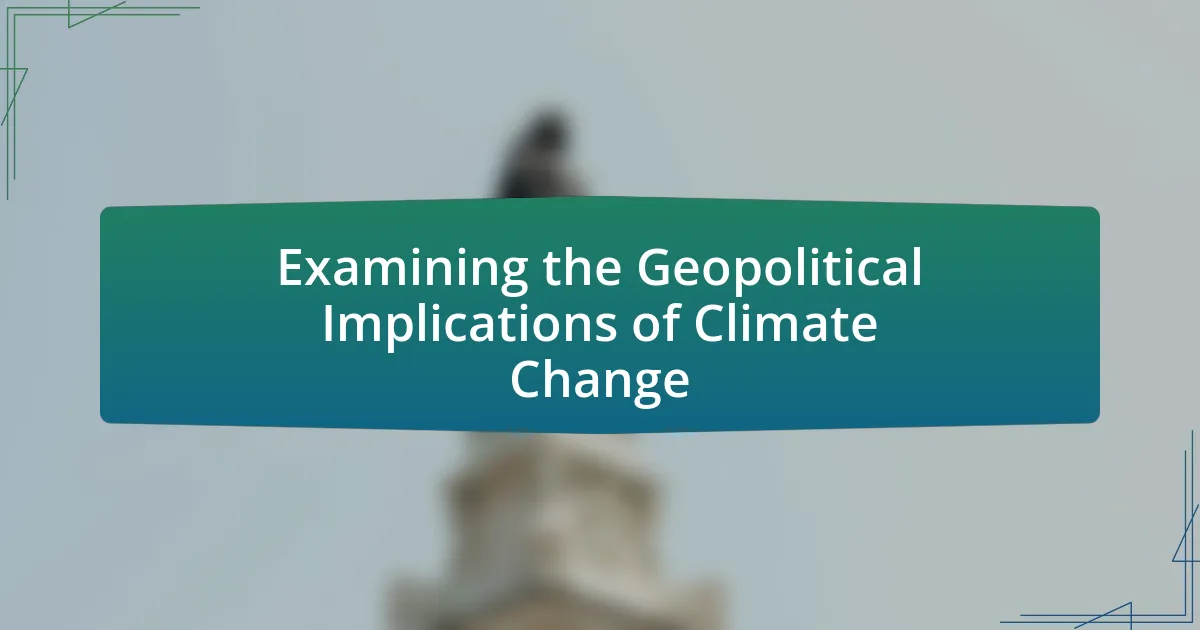Multilateralism is a diplomatic approach involving multiple countries in collective decision-making to address global issues, exemplified by organizations like the United Nations and agreements such as the Paris Agreement. The article explores the evolution of multilateralism, highlighting its historical foundations and the impact of key events like the establishment of the League of Nations and the United Nations. It examines the importance of multilateralism in today’s global landscape, the challenges posed by nationalism and geopolitical tensions, and the opportunities it presents for cooperation on issues like climate change and security. Additionally, the article discusses the limitations of current multilateral frameworks and offers strategies to enhance their effectiveness, emphasizing the need for inclusive dialogue and equitable representation among nations.

What is Multilateralism?
Multilateralism is a diplomatic approach where multiple countries engage in collective decision-making and cooperation to address global issues. This framework is characterized by international agreements and organizations, such as the United Nations, which facilitate collaboration among nations to promote peace, security, and economic development. Historical examples include the establishment of the World Trade Organization in 1995, which aims to regulate international trade through negotiated agreements among member states, demonstrating the effectiveness of multilateralism in fostering global economic stability.
How has multilateralism evolved over time?
Multilateralism has evolved from a focus on state-centric diplomacy to a more inclusive approach that incorporates non-state actors and global governance frameworks. Initially, multilateralism was primarily practiced through treaties and alliances among sovereign states, exemplified by the Concert of Europe in the 19th century, which aimed to maintain balance and peace among major powers. Over time, particularly after World War II, multilateralism expanded to include international organizations like the United Nations, which established norms for collective security and cooperation on global issues such as human rights and development. The end of the Cold War further accelerated this evolution, leading to increased participation from non-governmental organizations and civil society in multilateral processes, as seen in the establishment of the World Trade Organization and various climate agreements. This shift reflects a recognition that global challenges require collaborative solutions beyond traditional state interactions.
What historical events have shaped the concept of multilateralism?
The concept of multilateralism has been shaped by several key historical events, including the establishment of the League of Nations in 1920, the formation of the United Nations in 1945, and the Bretton Woods Conference in 1944. The League of Nations aimed to promote peace and cooperation among countries after World War I, although it ultimately failed to prevent further conflict. The United Nations was created to foster international collaboration and prevent wars, reflecting a commitment to multilateral diplomacy. The Bretton Woods Conference established a framework for international economic cooperation, leading to institutions like the International Monetary Fund and the World Bank, which further institutionalized multilateralism in economic governance. These events collectively laid the groundwork for the modern understanding and practice of multilateralism in global affairs.
How do different countries define multilateralism?
Different countries define multilateralism as a cooperative approach to international relations that involves multiple nations working together to address global issues. For instance, the United States often emphasizes multilateralism in terms of collective security and economic partnerships, as seen in its participation in NATO and trade agreements. In contrast, countries like China view multilateralism as a means to promote a multipolar world, advocating for inclusive dialogue and cooperation through platforms like the Shanghai Cooperation Organization. Additionally, European Union member states typically define multilateralism as essential for maintaining peace and stability, focusing on shared values and collective action in global governance. These definitions reflect each country’s strategic interests and historical contexts, illustrating the diverse interpretations of multilateralism in international relations.
Why is multilateralism important in today’s global landscape?
Multilateralism is important in today’s global landscape because it fosters cooperation among nations to address complex global challenges. This collaborative approach enables countries to tackle issues such as climate change, trade disputes, and security threats more effectively than unilateral actions. For instance, the Paris Agreement, which involves nearly 200 countries, exemplifies how multilateralism can unite diverse nations to combat climate change collectively, demonstrating that shared goals lead to more substantial outcomes than isolated efforts.
What role does multilateralism play in international relations?
Multilateralism plays a crucial role in international relations by facilitating cooperation among multiple countries to address global challenges. It enables nations to collaborate on issues such as trade, security, and environmental protection, fostering a collective approach that enhances diplomatic engagement. For instance, organizations like the United Nations and the World Trade Organization exemplify multilateral frameworks that promote dialogue and consensus-building among member states, leading to more stable and predictable international interactions. This collaborative approach is essential for managing complex global issues that no single nation can effectively tackle alone, as evidenced by the collective response to climate change through agreements like the Paris Accord.
How does multilateralism contribute to global governance?
Multilateralism contributes to global governance by facilitating cooperation among multiple countries to address shared challenges. This collaborative approach enables nations to create binding agreements and frameworks that enhance collective decision-making, such as the Paris Agreement on climate change, which involves nearly 200 countries committing to reduce greenhouse gas emissions. By pooling resources and expertise, multilateralism allows for more effective responses to global issues like pandemics, trade disputes, and security threats, thereby strengthening international norms and institutions.

What are the key challenges facing multilateralism?
The key challenges facing multilateralism include rising nationalism, geopolitical tensions, and the erosion of trust among nations. Nationalism has surged in various countries, leading to a preference for unilateral actions over collaborative efforts, as seen in the withdrawal of the United States from international agreements like the Paris Climate Accord. Geopolitical tensions, particularly between major powers such as the United States and China, complicate consensus-building in multilateral forums, evidenced by stalled negotiations in organizations like the World Trade Organization. Additionally, the erosion of trust is highlighted by increasing skepticism towards multilateral institutions, as demonstrated by the criticism of the United Nations’ effectiveness in addressing global crises. These challenges collectively hinder the ability of nations to work together effectively on pressing global issues.
How do geopolitical tensions impact multilateral efforts?
Geopolitical tensions significantly hinder multilateral efforts by creating divisions among nations, which complicates consensus-building. For instance, the ongoing tensions between the United States and China have led to a fragmented international landscape, where countries align with one of the two powers, thereby undermining collaborative initiatives such as climate agreements or trade pacts. Historical examples include the failure of the Doha Development Round, which stalled due to conflicting interests among major economies, illustrating how geopolitical rivalries can derail collective action.
What examples illustrate the effects of nationalism on multilateralism?
Nationalism has significantly impacted multilateralism, as evidenced by the United Kingdom’s Brexit decision and the United States’ withdrawal from the Paris Agreement. Brexit, which was driven by a nationalist agenda, led to the UK’s exit from the European Union, disrupting established multilateral trade and political agreements. This shift illustrates how nationalist sentiments can undermine cooperative frameworks that rely on collective decision-making. Similarly, the U.S. withdrawal from the Paris Agreement in 2017, motivated by a nationalist focus on domestic interests over global climate commitments, weakened international efforts to combat climate change, showcasing how nationalism can hinder global cooperation on pressing issues. These examples demonstrate that nationalism can lead to a retreat from multilateral engagements, affecting global governance and collaboration.
How do economic disparities influence multilateral negotiations?
Economic disparities significantly influence multilateral negotiations by creating power imbalances among participating countries. Wealthier nations often have greater leverage, allowing them to shape agendas and outcomes in their favor, which can marginalize the interests of poorer countries. For instance, during the World Trade Organization negotiations, developed countries have historically pushed for trade rules that benefit their economies, while developing nations struggle to advocate for their needs, such as agricultural subsidies and market access. This dynamic can lead to unequal agreements that fail to address the concerns of less affluent nations, ultimately undermining the effectiveness and fairness of multilateral cooperation.
What are the limitations of current multilateral frameworks?
Current multilateral frameworks face several limitations, including inefficiency in decision-making, lack of inclusivity, and challenges in enforcement. Inefficiency arises from the need for consensus among diverse member states, which can lead to prolonged negotiations and delays in addressing urgent global issues. Lack of inclusivity is evident as smaller nations often feel marginalized, limiting their participation and influence in discussions. Additionally, enforcement challenges occur because many agreements rely on voluntary compliance, making it difficult to hold states accountable for non-compliance. These limitations hinder the effectiveness of multilateral frameworks in addressing complex global challenges such as climate change and international security.
How do institutional inefficiencies hinder multilateral cooperation?
Institutional inefficiencies hinder multilateral cooperation by creating barriers to effective decision-making and resource allocation. These inefficiencies often manifest as bureaucratic delays, lack of coordination among member states, and inadequate communication channels, which can lead to fragmented efforts and reduced trust among participants. For instance, the United Nations has faced criticism for slow responses to global crises due to its complex decision-making processes, which can delay timely interventions. Such delays can exacerbate issues like climate change or humanitarian crises, ultimately undermining the collective ability to address global challenges effectively.
What challenges arise from differing national interests?
Differing national interests create significant challenges in multilateral negotiations and cooperation. These challenges manifest as conflicting priorities, which can lead to stalemates in decision-making processes. For instance, during climate change negotiations, developed nations often prioritize economic growth, while developing nations emphasize immediate developmental needs, resulting in disagreements that hinder collective action. Additionally, differing national interests can exacerbate tensions, as seen in trade disputes where countries prioritize their economic advantages over collaborative solutions. Such conflicts can undermine trust among nations, making it difficult to achieve consensus on global issues.

What opportunities does multilateralism present?
Multilateralism presents opportunities for enhanced cooperation among nations, enabling collective action on global issues such as climate change, trade, and security. This collaborative approach allows countries to pool resources, share knowledge, and create unified strategies, which can lead to more effective solutions than unilateral actions. For instance, the Paris Agreement on climate change exemplifies how multilateral efforts can mobilize countries to commit to reducing greenhouse gas emissions, demonstrating the potential for significant environmental impact through coordinated action.
How can multilateralism address global issues like climate change?
Multilateralism can address global issues like climate change by fostering international cooperation and collective action among countries. Through frameworks such as the Paris Agreement, nations commit to reducing greenhouse gas emissions and sharing technology and resources, which enhances global efforts to combat climate change. For instance, the Paris Agreement, adopted in 2015, aims to limit global warming to well below 2 degrees Celsius, demonstrating how multilateral agreements can unify diverse countries towards a common goal. Additionally, multilateral organizations like the United Nations facilitate dialogue and provide platforms for accountability, enabling countries to collaborate on climate initiatives and share best practices, which is crucial for effective climate action.
What successful multilateral agreements have been made in environmental policy?
Successful multilateral agreements in environmental policy include the Paris Agreement, the Montreal Protocol, and the Convention on Biological Diversity. The Paris Agreement, adopted in 2015, aims to limit global warming to well below 2 degrees Celsius, with 195 countries committing to nationally determined contributions to reduce greenhouse gas emissions. The Montreal Protocol, established in 1987, successfully phased out the use of ozone-depleting substances, leading to the recovery of the ozone layer. The Convention on Biological Diversity, signed in 1992, focuses on the conservation of biodiversity, sustainable use of its components, and fair sharing of benefits arising from genetic resources, with 196 parties participating. These agreements demonstrate effective international cooperation in addressing environmental challenges.
How does multilateralism facilitate technological cooperation?
Multilateralism facilitates technological cooperation by creating platforms for countries to collaborate on shared technological challenges and innovations. Through international agreements and organizations, nations can pool resources, share knowledge, and establish common standards, which enhances the development and dissemination of technology. For instance, initiatives like the World Trade Organization’s Trade-Related Aspects of Intellectual Property Rights (TRIPS) Agreement promote cooperation by harmonizing intellectual property laws, thus encouraging innovation across borders. This collaborative framework not only accelerates technological advancements but also ensures equitable access to emerging technologies, as seen in global efforts to address climate change through shared clean energy technologies.
What role does multilateralism play in promoting peace and security?
Multilateralism plays a crucial role in promoting peace and security by facilitating cooperation among multiple nations to address global challenges collectively. This collaborative approach enables countries to engage in dialogue, build trust, and create frameworks for conflict resolution, thereby reducing the likelihood of disputes escalating into violence. For instance, the United Nations, through its peacekeeping missions and diplomatic efforts, has successfully mediated conflicts and maintained stability in regions such as the Balkans and West Africa, demonstrating the effectiveness of multilateral engagement in fostering a secure international environment.
How do multilateral organizations contribute to conflict resolution?
Multilateral organizations contribute to conflict resolution by facilitating dialogue and negotiation among conflicting parties. They provide a neutral platform where states can engage in discussions, often leading to peace agreements and conflict de-escalation. For instance, the United Nations has played a crucial role in mediating conflicts such as the peace process in Colombia, where its involvement helped to broker a historic peace agreement between the government and FARC rebels in 2016. Additionally, multilateral organizations often deploy peacekeeping missions, which help maintain stability and protect civilians in post-conflict situations, as seen in the UN peacekeeping operations in the Democratic Republic of the Congo. These organizations also promote international norms and frameworks that encourage peaceful conflict resolution, thereby reducing the likelihood of violence.
What are the benefits of collective security arrangements?
Collective security arrangements provide a framework for nations to ensure mutual defense against aggression, enhancing overall security. These arrangements deter potential aggressors by demonstrating a united front, as seen in NATO’s Article 5, which states that an attack on one member is an attack on all. Additionally, collective security fosters diplomatic cooperation and conflict resolution, reducing the likelihood of war through dialogue and negotiation. Historical examples, such as the United Nations’ peacekeeping missions, illustrate how collective security can stabilize regions and prevent conflicts from escalating.
What best practices can enhance the effectiveness of multilateralism?
Best practices that can enhance the effectiveness of multilateralism include fostering inclusive dialogue, ensuring equitable representation, and promoting transparency in decision-making processes. Inclusive dialogue allows diverse perspectives to be heard, which strengthens consensus-building and cooperation among member states. Equitable representation ensures that all countries, regardless of size or power, have a voice in negotiations, thereby increasing legitimacy and commitment to multilateral agreements. Transparency in decision-making processes builds trust among nations, as it allows stakeholders to understand the rationale behind decisions and fosters accountability. These practices are supported by historical examples, such as the success of the United Nations Framework Convention on Climate Change, where inclusive dialogue and equitable representation have led to significant global agreements like the Paris Agreement.
How can countries improve their participation in multilateral negotiations?
Countries can improve their participation in multilateral negotiations by enhancing diplomatic capacity and fostering inclusive dialogue. Strengthening diplomatic resources, such as training skilled negotiators and investing in research on negotiation strategies, enables countries to engage more effectively. For instance, nations that prioritize capacity-building initiatives, like the United Nations’ training programs, have shown improved negotiation outcomes. Additionally, promoting inclusive dialogue by involving diverse stakeholders, including civil society and private sector representatives, leads to more comprehensive and representative negotiations. Evidence from the Paris Agreement negotiations illustrates that broad stakeholder engagement can enhance legitimacy and support for multilateral agreements.
What strategies can be employed to strengthen multilateral institutions?
To strengthen multilateral institutions, enhancing cooperation among member states is essential. This can be achieved through regular dialogue and negotiation platforms that facilitate consensus-building on global issues. For instance, the United Nations has successfully utilized forums like the General Assembly to address pressing challenges, demonstrating the effectiveness of collaborative engagement. Additionally, increasing financial contributions from member states can bolster the operational capacity of these institutions, as evidenced by the World Health Organization’s response to global health crises, which relies on adequate funding to implement effective programs. Furthermore, promoting transparency and accountability within these institutions can build trust among member states, encouraging greater participation and commitment. Historical examples, such as the establishment of the European Union, illustrate how shared governance and mutual benefits can lead to stronger multilateral frameworks.




